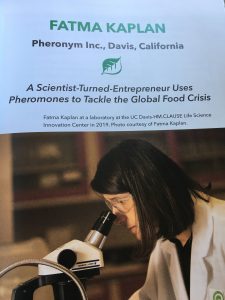Women innovators revolutionizing how our food is grown by Amy Wu.
Our founder Dr. Kaplan’s profile is on pages 121-130.


A scientist-turned-entrepreneur uses pheromones to tackle the global food crisis.
Women innovators revolutionizing how our food is grown by Amy Wu.
Our founder Dr. Kaplan’s profile is on pages 121-130.


A scientist-turned-entrepreneur uses pheromones to tackle the global food crisis.
 Excited to be in the 7th cohort of Thrive Ag Accelerator. Pheronym is among the 12 companies that were selected from 600+ applications. Keep reading.
Excited to be in the 7th cohort of Thrive Ag Accelerator. Pheronym is among the 12 companies that were selected from 600+ applications. Keep reading.
From Farms to Incubators: How Accelerators Act as a Springboard for Women in Agtech By Amy Wu
What does it take to enter the agriculture and innovation space?

Fatma Kaplan is the founder and CEO of Pheronym, an agtech startup that produces biopesticides that use pheromones (chemicals capable of acting like hormones to impact the behavior of the receiving individuals) to control a wide range of agricultural pests. The company’s mission is to help growers control pests in an eco-friendly way. Pheronym is based in Davis, Calif., located in the Central Valley—an agricultural mecca in the U.S.
It is one of a growing number of agtech startups launched by women. Agtech is loosely defined as innovation, including hardware and software, that helps farmers work more efficiently.
Kaplan is not your conventional startup entrepreneur. Keep Reading.
This article was also featured by Hortidaily.
Her Startup: Encounters with women entrepreneurs who launched their own companies in ag & food, from seed to health
Join the panel discussion on Thursday, April 8 from 3:00 to 4:30 PM (U.S. Pacific time).
If you missed the panel, you got a second chance. Here is the link to the panel.
Pheronym’s first product, still in prototype, improves the efficacy of beneficial nematodes up to 78% and is “bee-friendly.” The company’s second product protects young and vulnerable plants from crop-destroying plant-parasitic nematodes. The company’s approach to pest control helps farmers grow more food in a more sustainable way, explains CEO/CSO Dr. Fatma Kaplan.
Interview: For years, pesticides were applied to the ground from above. What sparked the idea to take the battle underground and employ pheromones?
Underground pests are not as readily visible as the ones above ground. They are out of sight, out of mind. But farmers know about them because they reduce the yield. I am aware of them because I grew up on a family farm and have a degree in agriculture. I am also very familiar with the benefits of pest control.
I got the idea in 2005 when I accepted a postdoctoral position to identify the model nematode’s (Caenorhabditis elegans) sex pheromone and discovered that nematode pheromones were water-soluble. I knew how these discoveries could revolutionize agricultural pest control for nematodes. Pheromones have been used to control insects successfully for decades. Why not for nematodes? Since nematode pheromones were water-soluble, we could apply them with irrigation water to the soil where plant-parasitic nematodes attack plant roots. Keep Reading